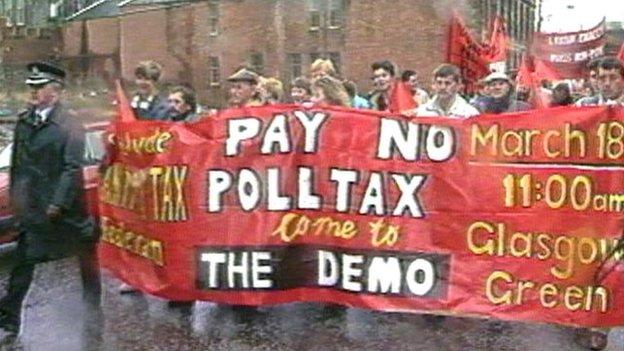Secret papers reveal push to 'trailblaze' poll tax in Scotland
- Published
The poll tax was introduced in Scotland in 1989
Newly-released cabinet papers from Margaret Thatcher's time in power have confirmed that then Scottish Secretary George Younger pushed for the poll tax to be introduced early in Scotland.
Documents from 1985, opened up under the 30-year rule, show he had wanted to "trailblaze" the new charge in Scotland ahead of the rest of the UK.
The note was written by Oliver Letwin, as an advisor in the Tory policy unit.
Mr Letwin, who is now a member of the UK government, declined to comment.
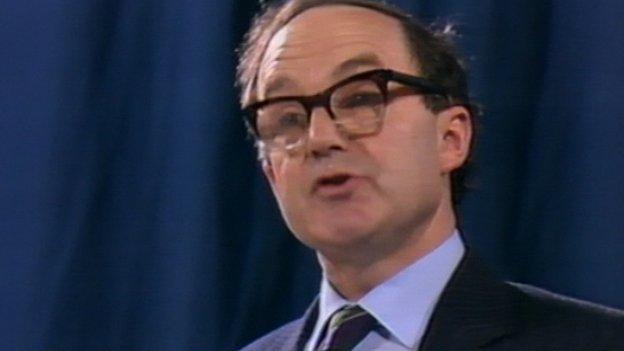
George Younger , who died in 2003, was Scottish secretary until 1986
The community charge, widely referred to as the poll tax, was a new system of taxation introduced to replace domestic rates.
It was a single flat-rate tax on every adult, set by the local authority.
The poll tax was introduced in Scotland from 1989 and in England and Wales from 1990.
Many refused to pay it and the subsequent protests and riots contributed to Mrs Thatcher's downfall as prime minister.
After widespread civil unrest and protest, it was replaced by the council tax in 1993.
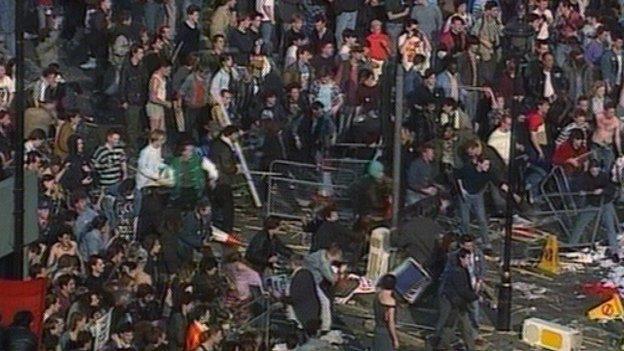
Anger over the poll tax saw outbreaks of unrest on the streets
Secret cabinet papers have now confirmed it was Mr Younger, Mrs Thatcher's Scottish Secretary from 1979 to 1986, who fought to introduce the community charge early.
A memo written by Mr Letwin in 1985, four years before it came into force, states that Mr Younger, who died in 2003, was "extremely keen to use Scotland as a trail blazer for the pure residence charge".
He was also keen to avoid a further disastrous revaluation for the domestic rates system.
The memo from Mr Letwin describes Scotland as an ideal testbed to experiment the radical system and suggests early introduction could help find "undetected gremlins lurking in the proposals".
The opened archives highlight why Mr Younger, later Lord Younger, was so keen on a new system to replace the rates.
The previous rating revaluation had sent charges soaring and had been extremely unpopular - and a further revaluation loomed.
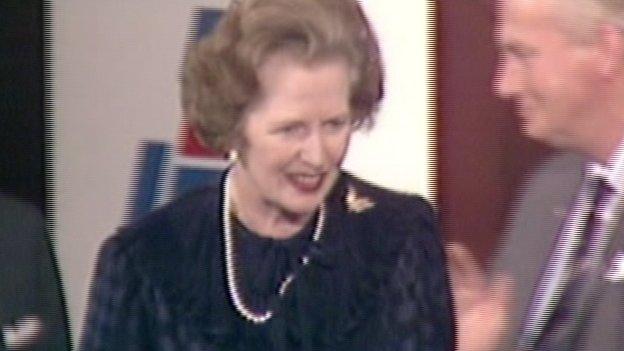
Margaret Thatcher was the prime minister who introduced the community charge
However, the opened archives also reveal a memo penned by the then Chancellor of the Exchequer, Nigel Lawson, who said the measure would be "unworkable" and "politically catastrophic".
"The biggest gainers will be the better-off households in high rateable value properties, the losers would be poorer households, particularly larger ones," he wrote.
"We should be forced to give so many exceptions and concessions (inevitably to the benefit of high-spending authorities in inner London) that the flat-rate poll tax would rapidly become a surrogate income tax."
The newly-released papers also highlight detailed discussions about the Barnett formula. Invented in the 1970s, it is the method by which the Treasury still shares out the UK's public expenditure.
Some English MPs have long argued that it benefits Scotland and disadvantages their constituents.
In a memo to Mrs Thatcher, David Willetts claims that Scotland and Northern Ireland "have their snouts well and truly in the the public expenditure trough".
Mr Willetts, who was then a policy adviser, is a former minister in the present coalition administration and remains a senior Tory MP.
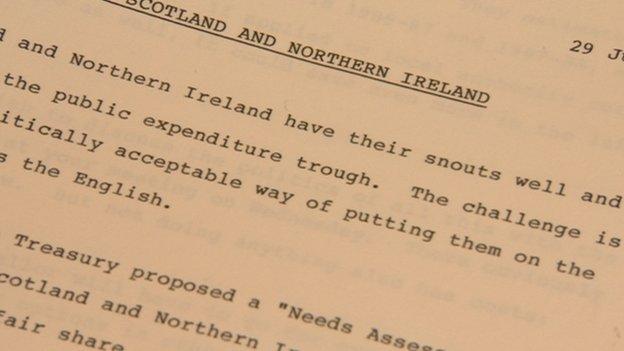
The newly-released documents also show moves to reduce funding to Scotland
He has declined to comment.
The SNP's deputy leader Stewart Hosie said Mr Willetts' comments were "quite shocking" and claimed that "nothing has changed with the Tories".
The Dundee East MP said the comments showed "the same people 30 years ago making the same mistakes they are making today, ignoring the contribution Scotland makes and always only ever talking about expenditure".
On the poll tax, Mr Hosie said: "It confirms what many of us had been saying at the time and since, that Scotland was used as a guinea pig for this terrible legislation.
"This was not introduced for good reason, say to cut the rates bill. It was introduced to test the system because they knew it was fundamentally flawed."
Labour's shadow Scottish secretary Margaret Curran said: "It confirms the truth of what we were saying. They were using Scotland as a test-bed for the poll tax and they were trying to undermine the Barnett Formula."
A spokesman for the Scottish Conservatives said: "Many things have changed over the last 30 years, not least the fact that, under Ruth Davidson, the Scottish Conservatives are backing an even stronger Scottish Parliament with its own tax raising powers. That will make the old arguments from the 1980s even more out of date than they are already.
"Judging from the response from both the SNP and Labour, it sadly appears that we still have two parties in Scotland who prefer to dwell on the past rather than focus on the future."
- Published4 December 2014
